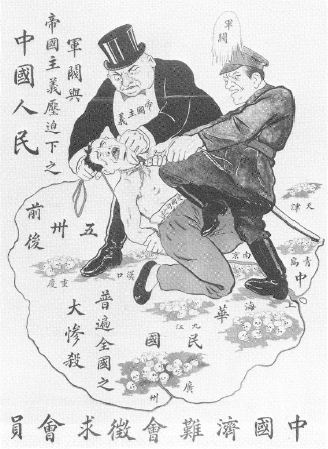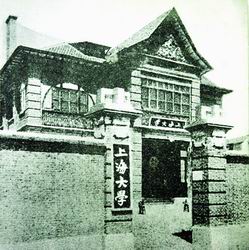|
Xie Xuehong
Xie Xuehong (; 17 October 1901 – 5 November 1970), born Xie Shi Anu (), was a Chinese politician. A women's rights activist, she cofounded the Taiwanese Communist Party, active in Japanese Taiwan. Persecuted by the Kuomintang after its forces retreated to Taiwan, she escaped to mainland China, where she became a member of the Taiwan Democratic Self-Government League and the Chinese Communist Party. Biography Xie was born in Changhua County in 1901 to a working-class family, the fourth of seven children. She assumed at least five other names throughout her lifetime. At the age of twelve, she moved in with another family. Her adoptive family was abusive, and, instead of entering an arranged marriage with their son, Hong Xinhu, she left their home. Xie met and married Zhang Shumin in 1918. For a time, the couple lived in Kobe, Japan, where the Taishō period of democracy heavily influenced Xie. Soon after Xie and Zhang moved to China, the couple split, as Xie had discovered that Z ... [...More Info...] [...Related Items...] OR: [Wikipedia] [Google] [Baidu] |
Taiwan Democratic Self-Government League
The Taiwan Democratic Self-Government League (TDSL), also known by its Chinese abbreviation Taimeng ( zh , s = 台盟 , t = 臺盟 ), is one of the eight legally recognized minor political parties in the People's Republic of China that are members of the Chinese People's Political Consultative Conference under the Chinese Communist Party's United Front. It was founded in the then-British colony of Hong Kong in November 1947, by members of the Taiwanese Communist Party who survived the February 28 incident. The Taiwan Democratic Self Government League has a membership of 3,000 people, most of whom are prominent people from Taiwan or are of Taiwanese heritage but now reside on the mainland. Additionally, with only 13 seats in the National People's Congress and three seats in the Standing Committee of the National People's Congress, the Taiwan Democratic Self-Government League is the smallest legally recognized minor political party in the People's Republic of China. The party ... [...More Info...] [...Related Items...] OR: [Wikipedia] [Google] [Baidu] |
Formosan League For Reemancipation
The Formosan League for Reemancipation was the first organization supportive of the Taiwan independence movement to be established outside the island of Taiwan after World War II. It was founded on 28 February 1948 in Hong Kong. and Thomas Liao founded the organization after Thomas's brother had been arrested during the February 28 Incident of 1947 by authorities in Shanghai. Upon his release from prison, Joshua was entrusted with responsibility of coordinating the actions of FLR members in Nanking and Shanghai. Thomas oversaw FLR activists based in Japan, Hong Kong, and Taiwan. The organization maintained direct contact with government officials in the United States and the Philippines. The Central Intelligence Agency collected information on the FLR. The league submitted a petition to the United Nations on 1 September 1948, asking the intergovernmental organization to take control of Taiwan's sovereignty and administration, thereby removing the Kuomintang from power. In 1949, ... [...More Info...] [...Related Items...] OR: [Wikipedia] [Google] [Baidu] |
27 Brigade
27 Brigade () was a guerrilla force formed in Taichung, Taiwan, shortly after the outbreak of February 28 Incident. It was organized by Hsieh Hsueh-hung, a leading figure of Taiwanese Communist Party during the Japanese Administration Era, and was led by local Taichung scholar . The total strength of the brigade remains disputed, with sources putting it as low as 30 and as many as 4,000; however, it is agreed that the bulk of the force was made up of young students and discharged soldiers who had fought in World War II for the Empire of Japan. One source also claims that the 27 Brigade discovered a secret weapon cache left by the Japanese that contained enough weapons and ammunition to arm "three whole divisions," which remains disputed today. On 15 March 1947, when the Kuomintang The Kuomintang (KMT), also referred to as the Guomindang (GMD), the Nationalist Party of China (NPC) or the Chinese Nationalist Party (CNP), is a major political party in the Republic of China ... [...More Info...] [...Related Items...] OR: [Wikipedia] [Google] [Baidu] |
Taiwanese Identity
Taiwanese people may be generally considered the people of Taiwan who share a common culture, ancestry and speak Taiwanese Mandarin, Hokkien, Hakka or indigenous Taiwanese languages as a mother tongue. Taiwanese people may also refer to the indigenous peoples of the areas under the control of the Government of the Republic of China since 1945, including Penghu as well as Kinmen and Matsu Islands that collectively form its streamlined Fujian Province (see Taiwan Area). However, the inhabitants of Kinmen and the Matsu themselves may not consider the "Taiwanese" label to be accurate as they are a part of Fujian and not Taiwan. They have a distinctive identity from that of the Taiwanese; viewing themselves as Kinmenese or Matsunese, respectively, or as simply Chinese. At least three competing (occasionally overlapping) paradigms are used to identify someone as a Taiwanese person: nationalist criteria, self-identification (including the concept of "New Taiwanese") criteria and s ... [...More Info...] [...Related Items...] OR: [Wikipedia] [Google] [Baidu] |
Taiwanese Cultural Association
The Taiwanese Cultural Association (TCA; ) was an important organization during the Japanese rule of Taiwan. It was founded by Chiang Wei-shui on 17 October 1921, in Daitōtei, a district in modern-day Taipei. History After World War I, an epidemic of self-determination and democracy engulfed the world. Needless to say, Taiwan was also inundated with this new sense of independence. Inspired by the Samil Movement in Korea in 1919, Taiwanese college students in Japan further developed their craving for an independent Taiwan. At that time, only affluent Taiwanese families could send their children to Japanese universities. Most of these children were born and raised during Japanese colonization of Taiwan. Therefore, they were taught using Japanese methods and customs quite different from the education of their parents, a formal Chinese education teaching strictly traditions and ancient philosophies. In Japan, Taiwanese students underwent extreme racism from not only Japanese studen ... [...More Info...] [...Related Items...] OR: [Wikipedia] [Google] [Baidu] |
Japanese Communist Party
The is a left-wing to far-left political party in Japan. With approximately 270,000 members belonging to 18,000 branches, it is one of the largest non-governing communist parties in the world. The party advocates the establishment of a democratic society based on scientific socialism and pacificism. It believes this objective can be achieved by working within an electoral framework while carrying out an extra-parliamentary struggle against " imperialism and its subordinate ally, monopoly capital". As such, the JCP does not advocate violent revolution and instead proposes a "democratic revolution" to achieve "democratic change in politics and the economy". A staunchly antimilitarist party, the JCP firmly supports Article 9 of the Japanese Constitution and aims to dissolve the Japan Self-Defense Forces. The party also opposes Japan's security alliance with the United States, viewing it as an unequal partnership and an infringement on Japanese national sovereignty. In the wak ... [...More Info...] [...Related Items...] OR: [Wikipedia] [Google] [Baidu] |
Sen Katayama
Sen may refer to: Surname * Sen (surname), a Bengali surname * Şen, a Turkish surname * A variant of the Serer patronym Sène Currency subunit * Etymologically related to the English word ''cent''; a hundredth of the following currencies: ** Brunei dollar ** Cambodian riel ** Malaysian ringgit ** Indonesian rupiah * Etymologically unrelated to the English word ''cent''; a hundredth of the following currency: ** Japanese yen - People * Amartya Sen (born 1933), Indian economist and philosopher * Aparna Sen (born 1945), an Indian filmmaker and actress * Antara Dev Sen Antara Dev Sen (born 1963) is an Indian journalist based in Delhi. Biography Antara was born in Cambridge, England and did her schooling in Delhi and later in Kolkata and higher education in India (Kolkata) and United States. Sen also studied at ... (born 1963), a British–Indian journalist * Asit Sen (actor) (1917 – 1993), an Indian actor * Kaushik Sen (or Koushik Sen), an Indian actor * Ko Chung Sen (born ... [...More Info...] [...Related Items...] OR: [Wikipedia] [Google] [Baidu] |
Communist University Of The Toilers Of The East
The Communist University of the Toilers of the East (KUTV) (russian: link=no, Коммунистический университет трудящихся Востока; also known as the Far East University) was a revolutionary training school for important communist political leaders. The school operated under the umbrella of the Communist International and was in existence from 1921 until the late 1930s. Part of the university was split into the Moscow Sun Yat-sen University. History The Communist University of the Toilers of the East (KUTV) was established in 1921 in Moscow by the Communist International (Comintern) as a technical college for communist cadres from the Soviet periphery, though it also matriculated students from the Arab world, Africa, and East and South Asia. The school officially opened on 21 October 1921. It performed a similar function to the International Lenin School, which mainly accepted students from Europe and the Americas. It was headed in it ... [...More Info...] [...Related Items...] OR: [Wikipedia] [Google] [Baidu] |
May Thirtieth Movement
The May Thirtieth Movement () was a major labor and anti-imperialist movement during the middle-period of the Republic of China era. It began when the Shanghai Municipal Police opened fire on Chinese protesters in Shanghai's International Settlement on May 30, 1925 (the Shanghai massacre of 1925). The shootings sparked international censure and nationwide anti-foreign demonstrations and riots. Roots of the Incident In the aftermath of the 1924 Second Zhili–Fengtian War, China found itself in the midst of one of the most destructive periods of turmoil since 1911.Waldron, Arthur, (1991) ''From War to Nationalism: China's Turning Point'', p. 5. The war had involved every major urban area in China, and badly damaged the rural infrastructure. As a result of the conflict the Zhili-controlled government, backed by varied Euro-American business interests, was ousted from power by pro-Japanese warlord Zhang Zuolin, who installed a government led by the generally unpopular statesman Duan ... [...More Info...] [...Related Items...] OR: [Wikipedia] [Google] [Baidu] |
Shanghai University
Shanghai University, commonly referred to as SHU, or colloquially Shangda (), is a public research university located in Shanghai. The 555-acre main Baoshan campus is situated in the north of Shanghai, and there are two other campuses in Jiading and Jing'an. It is co-funded by Chinese Ministry of Education and Shanghai Municipal Government as part of the Project 211 and the Double First Class University Plan for leading national universities. Jointly founded by the Nationalists and the Communists in 1922, the original cause for the Shanghai University was to nurture leaders for the Chinese revolution. It contributed a group of influential people to the cause of Chinese liberation and development. The university was discontinued in 1927 as a consequence of the Shanghai Massacre, in which the Nationalists purged all communist-related organizations. In 1983, the Chinese government reopened Shanghai University. And then in 1994, by integrating three other universities, it became ... [...More Info...] [...Related Items...] OR: [Wikipedia] [Google] [Baidu] |


